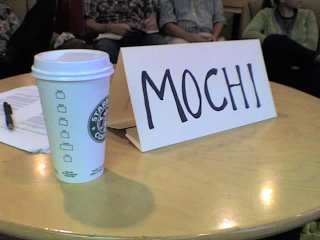MOCHI Summer Reading Series: Social Knowledge Construction - Are we really Smarter in groups?

July 27th 2006
6 - 8pm
Starbucks Coffee (South University)
Present:
Jude Yew
Jack Zaientz
Dan Cooney
Carl Collins
Mr. Collins (Carl's dad can't remember his name)
Steve Benninghoff
Dale Hunscher
Jiang Yang
Jennifer Faber
Peter Weinstein
Andrea Wiggins
George Furnas
Paul Hartzog
<**There's a set of photos in my flickr account**>
Notes from meeting:
- Meeting started with a discussion of papers with the most traction:
- Carl began the meeting by rasing Jaron Lanier's Digital Maoism
-- Carl felt the article was a pointed diatribe that highlighted a lot of negative aspects of taking organization out of the hands of experts.
-- of particular interest to the group = the comments section to the Digital Maoism paper
- Paul concurred with that and highlighted the fact that Lanier's article generated a lot of reaction online.
-- e.g. Rhiengold had a scathing response to the paper
-- general opinion was that Lanier had conflated digital collective action with collectivism
-- additionally Paul mentioned that BoingBoing archived a set of responses to the Lanier paper at the following URL: http://www.boingboing.net/2006/06/10/responses_to_jaron_l.html
- Jack raised the issue of the elimination of the individual with aggregation mechanisms = a point which Lanier highlights in his article
-- an example of this can be seen in wikipedia
-- however in systems like Flickr, it's much easier to track the individual there
-- the point was raised that authorship was the whole point of using wikipedia
- Jude brought up the fact that there is a great diversity of collective production and aggregation systems
-- Lanier's paper overlooks the subtlties of incentive and effort required to participate in each different system
-- e.g. participation in wikipedia is very different from participation in wikipedia
- a problem raised was the fact that in aggregation systems, postings don't reflect the extremes
- George explored the possibility of applying a recommender layer for aggregation systems like Digg
- the type of aggregation function depends on the information that you need
- e.g. number of jelly beans in a jar = perform simple mathematical average
- other information may require more complex forms of aggregations
* George introduced a project that he and Mark Ackerman were working on = "Social Knowledge enhancements for groups"
- central question behind this project = "what are the dimensions that these things vary on?"
- for instance in wikipedia = authoring not for oneself
- the purpose of this is to figure out the design space for these systems
- george raise an issue of interest:
-- aggregation of information at the knwoledge level is much harder than aggregating information at the data level
- A question raised by the group:
-- Does wikipedia encourage alternative points of views
-- in the hierarchy of knowledge representation structures, wikipedia is just one form by which information can be shaped
-- people tend to overlook the policies and social norms that go on behind the running of these systems
* an interesting problem to consider:
-- trying to impose categories that's not reflective of reality but is useful instead
- systems like wikipedia don't manifest the fact that there is a subjective point of view
Are we smarter as groups?
- dictionary vs. folksonomies
- need a point of reference to build on
-- thus the need for consesus
-- e.g. dictionaries 20 yrs ago = words would have very different meanings
* the opportunity provided now is that we are provided with a window into waht people are thinking about in the world
Transtion from secrecy to transparency
- Paul raised the issue of tag death
-- political theory of disagreement by deletion (censorship) and disagreement by ... (i spaced out here)
Ways that we can design these systems?
Some examples were raised by the group
- geocaching vs wunderground?
- t-mobile coverage maps
"Knowledge as infrastructure for action"
- how do you connect these systems to ongoing real issues
- web 2.0 vs political theory?
-- what are the consequences of the wisdom of crowds?
-- sometimes crowds are not smart
-- there's a good - bad continuum
Discussion around information in health systems
- web 2.0 = affecting the value system = basis on which health system infrastructure was founded on
- medical info = tightly controlled categories to enter information
- web2.0 = stop the presuposition that we can categorize the world
- ability to add things that weren't anticipated
- The bigger problem is institutional change
-- tight coupling between the culture of the institution and the systems that are enmployed
- problem of instituional inertia
- how do we inspire change within an organization?
- incentive structure?
- disruptive technology?

0 Comments:
Post a Comment
<< Home